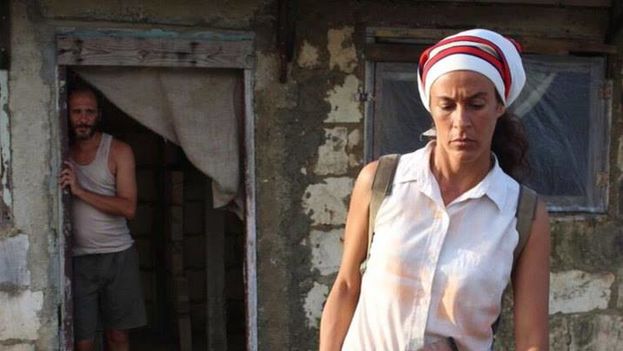
![]() 14ymedio, Luz Escobar, Havana, 23 November 2016 — The film Santa and Andrés will not be screened at the 38th edition of the Havana Film Festival, to be held between 8 and 18 December. Sources from the industry guild commented to 14ymedio that the exclusion of the independent film, directed by Carlos Lechuga, could be motivated by its theme, focusing on censorship against a gay intellectual in the early eighties.
14ymedio, Luz Escobar, Havana, 23 November 2016 — The film Santa and Andrés will not be screened at the 38th edition of the Havana Film Festival, to be held between 8 and 18 December. Sources from the industry guild commented to 14ymedio that the exclusion of the independent film, directed by Carlos Lechuga, could be motivated by its theme, focusing on censorship against a gay intellectual in the early eighties.
The 36th International Festival of New Latin American Cinema awarded the film the prize for an unpublished script, but it will not compete in this year’s festival. This decision came from “the highest authority,” several filmmakers told 14ymedio, and contrasts with the decision initially made by the event’s organizing committee, which gave a green light to the showing of the film.
An article in the official blog El Heraldo Cubano says that the plot of the movie “aims to highlight political persecution and attacks on the island that did not take place.” The article says that the film follows “a course of action that is not consistent with history.”
The article has circulated widely among filmmakers, and Carlos Lechuga, in a passionate response on his Facebook page, says that the author’s words are not only an attack on Santa and Andrés, but also represent “a critique and an attack on all independent cinema.”
The director, Enrique ‘Kiki’ Alvarez, has joined the defense of the film because he feels that the story of the two main characters, “who are opposites, she a revolutionary and he a censored writer, forced to be together,” ends up leading them “to a coming together and a recognition of the other that defines the humanistic will of this film.”
Lechuga continues to hope that the decision to exclude the movie from the most important film event on the island will be reversed. However, the filmmaker Miguel Coyula believes he “is still trying to have a dialogue of the deaf (…). We have to advocate for creating a space, an independent theater, where art films are shown without being dominated by the dictates of an institution.”
The official attack has ignored the vast number of awards received by Lechuga, including the Julio Alejandro Award from Spain’s General Society of Authors and Editors (SGAE). This is the second feature film by this young director, who captivated audiences with his film Molasses (2012).
Santa and Andrés premiered to a full house at the Toronto International Film Festival, and was also screened at San Sebastian, Chicago and Zurich. Its first showings were dedicated to Reinaldo Arenas, René Ariza, Nestor Almendros, Guillermo Cabrera Infante, Virgilio Piñera and José Lezama Lima.
Lechuga says that in the idea and filming of the work he was motivated by “the desire, the attempt, to hear the voice of many who were silenced or who suffered the repression of people who tried to silence them.”
The Havana Film Festival will show 440 films this year, with 36 of them competing for prizes. Among them, two Cuban productions will compete in the category of first works and three will compete for the award for best feature film.
For more than three years several Cuban filmmakers have defended, in open meetings ,the idea of a Film Law that would permit the development and operation of independent production houses.
